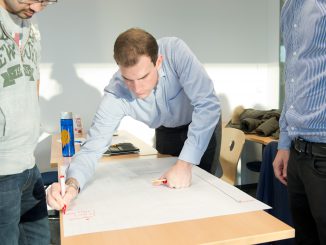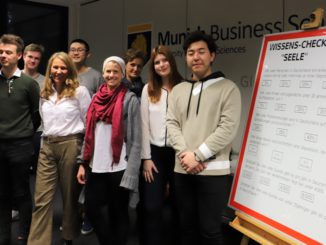
What is Service Learning and how can its potential be used for academic institutions?
Service Learning is a learning method that builds a bridge between lecture hall or classroom and civic involvement. It could be defined as: Learning as a service to the community. This term has been coined in the Anglo-American sphere where this form of learning and teaching has established itself decades ago. A German term has not yet been introduced. The English term has been around for 15 years in German-speaking countries, although these forms of learning and teaching emerged earlier, but were called differently. In the academic institutions, Service Learning is a form of campus-community partnerships. In general, campus-community partnership is the term for cooperation of academic institutions with organizations of civil society. Other approaches include:
1. Community-Based Research: This refers to working on research issues that have emerged from specific societal challenges in the surroundings of an academic institution.
2. Social Entrepreneurship: Social Entrepreneurship, ultimately, connects various academic disciplines by integrating entrepreneurial know-how with societal, social and ecological goals. The students learn to apply entrepreneurial methods to societal problems.
How can academic institutions use the potential of these learning and teaching methods?
The manner, in which the work of a university, of teachers and students, can be integrated into civic involvement, can take on many forms – there are, literally, no limits to imagination. Service Learning can mean, for example, that project management is taught and simultaneously practically designed and realized in a social project, as it is done under the Bachelor program of Munich Business School. A study course in architecture would develop concepts for energy-saving buildings in development countries; law students would participate in providing legal advice to underprivileged groups; and students of philological faculties would support refugees with language programs, just to name a few examples of other universities. Both sides – the students and society – benefit from such projects. And for the academic institutions, such campus-community partnerships are a gain from the strategic as well as the operative viewpoint.
Strategic impact
The strategic benefit for the university originates, for example, from an enhanced profile: Practice-orientation, professional applicability and the communication of a value-based approach stand at the core. The regional (or also the international) integration by the co-operation with organizations of civil society ensure the university’ improved visibility – among cooperation partners, but also in the media. In national and international rankings, campus-community partnerships are gaining relevance for profiling in reaching the goal of attaining “competence in civic participation” (i.e. assumption of responsibility within society). In addition, civic involvement also increases attractiveness for external donors.
Operative meaning
The operative importance for the university consists in state-of-the-art academic teaching, which – on account of being stronger oriented towards applicability – reaches beyond the traditional forms of practical training. The integration of civic involvement into academic teaching, for example in the form of a community-based research or learning by researching, – both representing additional forms of campus-community partnerships – offers a host of possibilities for teaching and learning. In this context, autonomous learning is of greatest significance: Students work out projects, develop concepts and implement events etc. autonomously. Assuming social responsibilities doubtlessly is an important promotor for developing the students’ personalities. Student performance is enhanced by practice-orientation, promoting key competences and professional skills.
According to the concept of the University of Kassel, teaching events can be considered as Service Learning, if they fulfill the following criteria:
- They offer a service for a non-profit organization, or an organization that is oriented towards the common good, that fulfills a genuine societal need, and creates real added value.
- They form an integral part of the university’s curriculum, are closely linked with the faculty/institute, are accompanied by experts and offer possibilities for reflection to students;
- They offer students direct contact with all relevant players and stakeholders outside the academic environment or enable immediate experience of specific social circumstances.
To better benefit from potential of these new learning approaches, campus-community partnerships at Munich Business School must, in the future, include more options in addition to Service Learning. Community-based research, for example, holds a great potential for reinforcing research activities. The integration of social entrepreneurship into the academic program could further sharpen the MBS profile.
Amplified use of these potentials is presently pushed, inter alia, by the participation of MBS in the dialogue platform “Transfer of Civil Society and Civic Involvement” (subsidized by the German Association for the Promotion of Science and Humanities within the scope of the “Campus and Community” program). Here, a dynamic exchange about these topics is presently taking place, not only among universities but also with organizations of civil society.
Since 2013, Munich Business School has been a member of the university network “Education by Responsibility”, and it will be a founding member of the non-profit network, into which the organization will be converted in 2015.
Sources:
The ideas and concepts for the description of the strategic and operative significance of campus-community partnerships are based on:
Stark, W./ Miller, J. / Altenschmidt, K. (2013): Zusammenarbeiten – Zusammen gewinnen – Was Kooperationen zwischen Hochschulen und Gemeinwesen bewirken können und was dafür nötig ist, Potenzialanalyse Campus Community Partnerships, University of Duisburg Essen.




